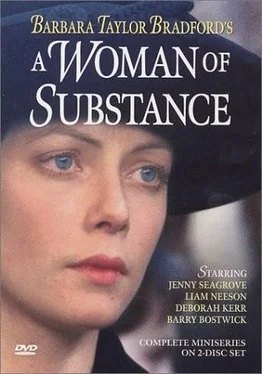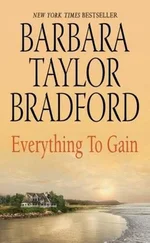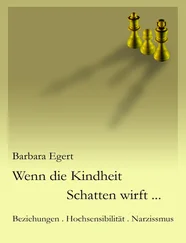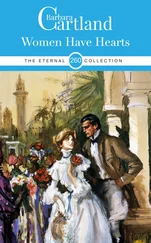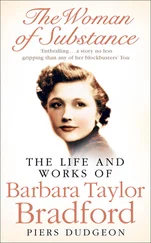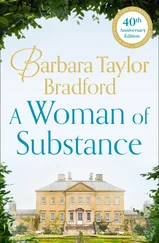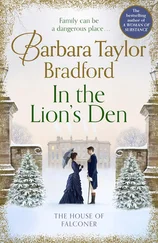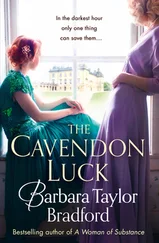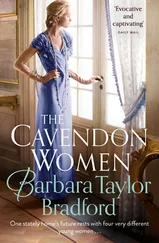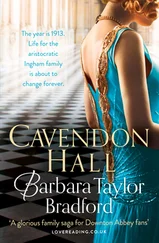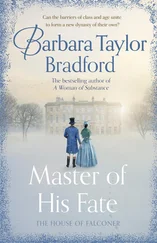Jim returned with his drink.
Emma lifted her glass. ‘I understand from Paula you want to speak to me.’
‘Yes, I do, Mrs Harte. But first I have something for you.’ He put down the drink and reached into his pocket. He took out a small silver cardboard box and handed it to her.
Emma looked up at Jim. ‘What is it?’
‘Open it,’ Jim said.
Emma did so quickly, her curiosity aroused. The box contained a silk handkerchief, its whiteness yellowed by time, and it had been carefully folded so that the initials E.F. were clearly visible. Her hands trembled as she lifted the corners. She caught her breath, staring down at the stone lying on the ancient silk. It was the flat pebble she and Edwin had found in the cave at the Top of the World, and upon which had been painted the miniature portrait of a woman. It was extraordinarily well preserved, the oils almost as vivid as they had been over half a century ago. She picked it up and gazed at it, and then lifted her eyes to Jim’s questioningly.
‘My grandfather gave it to me the day he died,’ Jim told her, watching her face. ‘He told me to bring it to you. He wanted you to have it.’
‘Why?’ Emma asked in a low voice. So Edwin Fairley had not forgotten her, after all. He had remembered her on his deathbed.
‘I’ll get to that in a moment, Mrs Harte. I’d like to explain something else first. My grandfather knew about my relationship with Paula. You see, I took her to meet him at his house in Harrogate, when we first started seeing each other. At the time I couldn’t understand why he looked as if he’d seen a ghost when she walked in. Anyway, over the months he grew to love her and he was enthusiastic about the match. It seemed to give him renewed energy. His dearest wish was that we should marry.’
Jim paused, lit a cigarette, drew on it, and went on, ‘Then Paula suddenly broke off with me, explaining that you would never accept a Fairley in the family, that you bore us a hatred she could not understand. She told me she would never do anything to cause you pain, because you had had too much pain and grief in your life. I argued with her, begged her to discuss it with you, or let me talk to you. But she became so hysterical at the mere suggestion of this, I decided to let her calm down, hoping she would have a change of heart. She didn’t, as you know.’
Emma nodded. ‘And you explained all this to your grandfather?’
‘I did. I implored him to enlighten me. Many times, in fact. He refused point-blank. I knew you had wrested control of the Gazette from him in 1950, and I asked him if your hatred towards our family sprang from business conflicts. Again he refused to answer me or discuss you. He seemed to go downhill when Paula left me. He brought me up, you know, and we were very close, but not even I could reach him. He grew awfully frail in the last few weeks of his life, and one day last December he sent for me. I think he knew he was dying-’
‘And he gave you this stone to give to me,’ Emma interrupted. ‘And he told you the whole story, didn’t he? He told you about me and what had happened between us when we were young,’ she finished in a faint voice.
‘Yes. He told me everything. He said he hoped you would relent and give us your blessing, but if you did not, I was to come to you with this stone. He said it was imperative that you knew it was a painting of your mother and not Olivia Wainright, as he had believed when he found it.’ Jim stopped and gazed at her, trying to gauge her emotions, but Emma’s face was a mask of inscrutability.
In point of fact, Emma was not surprised at his revelation. ‘I thought it was my mother,’ she murmured softly. ‘I think I always knew that. Adam Fairley painted it, did he not?’
‘That’s correct. Grandfather took the stone to his father after Olivia died, thinking he would want to have it for sentimental reasons. Apparently Grandfather had offered it to Adam before, and once again he wouldn’t accept it. My great-grandfather then explained why. He said it was a painting of your mother, and he told Grandfather they had been childhood sweethearts.’
Emma nodded her head slowly. ‘That was another thing I suspected years ago-that there had been a friendship between them.’
Jim took a deep breath. ‘Your mother and my great-grandfather were more than friends, Mrs Harte. They were lovers.’
Emma was jolted upright on the sofa and her fingers tightened on the stone. ‘Are you certain of that, Jim?’
‘Oh, yes. Great-grandfather explained it all to Grandfather very carefully and in detail. It seems Adam fell in love with your mother, Elizabeth, and she with him. She became pregnant by Adam and ran away from Fairley. He found her some weeks later in Ripon. He had decided to abandon his military career, defy his father, and emigrate to America with your mother. It was too late. She had miscarried. Adam did not know if it was a natural miscarriage or one induced by some quack midwife. Elizabeth was very ill. She almost died. And she would not countenance Adam’s idea of elopement. Eventually she recovered, returned to Fairley, and soon after she married your father, Jack Harte. And she never spoke to Adam Fairley again.’
Emma was silent, filled with a terrible aching sadness. I knew it always she thought. That was probably one of the reasons I hated Adam Fairley with such virulence. But how did I know? Did I overhear something as a child? A family quarrel? Recriminations between my parents? Local gossip? She searched her mind and found no answers.
Jim came and sat next to her on the sofa. ‘I hope I’m not upsetting you, Mrs Harte, opening old wounds that must be painful for you. However, I felt you ought to know Grandfather had confided in me, and I wanted you to have the stone, even though you had relented about Paula and me of your own accord.’
A wistful look flitted across Emma’s face. ‘No, you’re not upsetting me, Jim. I’m glad you followed your instincts. I loved my mother very much and I don’t have a photograph of her. I shall treasure the stone. Now, please continue. I’m sure there is more.’
‘Yes, there is. When Grandfather gave me the stone for you, he said that the Harte women had always held a fatal fascination for the Fairley men, but that they had been for ever crossed in love. “Doomed by circumstances of birth” was the phrase he used. He said, “Tell Emma to let it end now. Tell her to let this generation have the happiness she and I were denied, and which her mother and my father were denied. Tell her that in all good conscience she must end it, once and for all. Tell her it is she, and she alone, who can finally join our two families together in holy matrimony.” He was very emotional, Mrs Harte. I said I would do as he asked.’
Emma took Jim’s hand in hers, and her eyes, so old and wise, were moist. ‘Why didn’t you come to me before, Jim? Your grandfather has been dead three months.’
‘I was going to come to you in January, but then you and Paula left unexpectedly for America. When you returned, you fell ill. I intended to speak to you a few weeks ago, but you were so preoccupied I didn’t want to disturb you, particularly so soon after your illness.’ He smiled. ‘And then out of the blue you approached me and said you would approve of the marriage if we both still felt the same way.’
‘I’m glad I made the first move,’ Emma said. ‘Somehow it makes me feel better.’ She shook her head wonderingly. ‘It is strange, isn’t it, that three generations of Fairley men have fallen in love with Harte women and have always been thwarted until now. Three generations, Jim, spanning almost a hundred years.’ She sighed deeply. ‘Too long. And there has been too much heartbreak. Your grandfather was right. It must end now.’ She smiled. ‘Why, it has ended, hasn’t it, Jim?’
Читать дальше
Конец ознакомительного отрывка
Купить книгу
